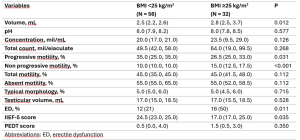Introduction: Obesity and diabetes are known to impair male fertility; their impact need to be further studied in type 1 diabetes (T1D) as the current evidence is not conclusive. Aim: To study the relationship between BMI, body composition and semen parameters among young adults with T1D. Methods: This cross-sectional study involved men aged 18-35 years, with T1D, treated with intensive insulin treatment, excluding patients with clinical conditions affecting male fertility. All participants underwent anthropometric measurements, blood test, semen analysis, bioelectrical impedance analysis (BIA) and completed the IIEF-5 and PEDT questionnaires. Clinical characteristics of the study population were described according to the BMI [overweight (BMI ≥25 kg/m2) and normal weight (BMI=18.5-24.9 kg/m2)]. Results: 88 men were included in the study. Median age was 24.5 years, median diabetes duration was 14.0 years and median BMI was 24.2 kg/m2. Overweight patients had higher fasting plasma glucose (p=0.008), HbA1c (p<0.001) and insulin daily dose (p=0.010) compared with normal-weight men. Overweight participants showed higher semen volume (p=0.012), lower progressive sperm motility (p=0.031), higher non progressive motility (p<0.001), higher prevalence of erectile dysfunction (p=0.011) and lower IIEF-5 score (p=0.035) than normal-weight participants. Univariate analysis showed that BMI was negatively associated with progressive motility (p=0.021) and positively associated with semen volume (p=0.013) and non-progressive motility (p<0.001); in multivariable analysis, non-progressive motility was associated with BMI (p<0.001). Multivariable regression analysis identified lower BMI (p=0.020) as independent predictor of normality of semen. Conclusions: Young adults with T1D and overweight showed worse semen parameters and worse sexual function, compared with participants with normal weight. BMI appears to be associated with progressive and non-progressive motility and semen volume and predicted semen quality.


